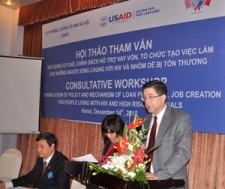
HANOI -- It is a pleasure to be here with you today for this important workshop. It's a workshop that will provide an opportunity to review and formulate a policy that will improve the economic livelihood of people living with HIV and AIDS, their families, and communities. But first, you will hear about successful strategies for increasing access to credit and working capital so PLHIV and other vulnerable populations can create employment for themselves and others.
Pilot initiatives in Vietnam have shown a direct link between employment and self-worth and renewed self-confidence. The increased realization of self-worth results in people taking better care of their health, their savings, and their own income generation - they are more optimistic and, perhaps most important, believe that they have a future worth investing it.
During today's program you will hear presentations on different models and approaches for implementing revolving loan funds for people living with HIV/AIDS and high-risk individuals. These models are managed by community-based organizations or microfinance provided by professional microfinance institutions, such as the Vietnam Bank for Social Policies and TYM of the Vietnam Women's Union, in partnership with local health care providers.
In Ho Chi Minh City, colleagues from the Workplace project highlighted for policy-making agencies successful pilot models which increased access to credit and savings plans that support innovative employment opportunities for micro-entrepreneurs, as well as job placement programs in cooperation with business partners.
The Workplace project staff also worked closely with the Vietnam Bank for Social Policies to help them better understand and work with beneficiaries. The VBSP staff worked with enterprises who embraced HIV prevention in the workplace, and provided support and jobs to the target population.
A recent study tour to the Center for Agriculture and Rural Development Mutual Reinforcing Institutions (CARD-MRI) in the Philippines provided the Vietnamese delegation an opportunity to learn from one of Asia's most successful and comprehensive microfinance service models for economically and socially challenged populations.
Today's forum will provide an opportunity for you to learn more about initiatives that are increasing access to credit for vulnerable populations. I look forward to a lively discussion and would like to pose the following questions for consideration:
- Are there gaps in existing policies aimed at providing vocational training, loans, and job creation to people living with HIV/AIDS and high-risk individuals?
- Are there incentives for enterprises that provide loans, vocational training, and employment to the target group? If not, should there be? And what should they be?
- What are the best ways to promote economic strengthening models for people living with HIV/AIDS and high-risk individuals?
- How can barriers to economic strengthening be reduced for target populations?
What should be included in a new policy and working mechanism that will coordinate and facilitate multiple government agencies - namely MOLISA, the Ministry of Finance, the State Bank and the Vietnam Bank for Social Policies - to support and provide loans, vocational training and job creation for the target population?
Many entrepreneurs supported with micro finance and non financial assistance have demonstrated that people living with HIV/AIDS have the capacity and passion to create and expand businesses while repaying their loans on time. They have proven that they are reliable clients for a financial institution.
By breaking down barriers to credit for PLHIV and other vulnerable groups, you are also helping reduce the stigma and discrimination that prevents many members of society from contributing and fulfilling their potential.
I wish you all a successful workshop and am confident that all of us will benefit from today's discussion.
Thank you.







Comment
Make a general inquiry or suggest an improvement.